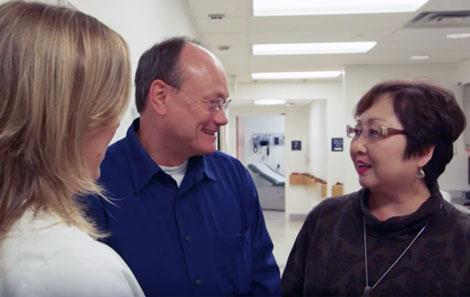Living Kidney Donation
Become a Living Kidney Donor
Why Should I Become a Living Kidney Donor?
Organ transplants can't happen without your generosity. About 85% of the people on the wait list for an organ need a kidney.
There aren't enough organs from deceased donors available. That means that many patients on the waiting list may die before they get a kidney.
A living kidney transplant gives patients another option. Living kidney transplants are safe and effective. And there are different ways you can become a living kidney donor.
Making Surgery Safer & Simpler
At UVA Health. we offer procedures that use smaller cuts (incisions) than traditional surgery. That means a shorter recovery time and faster healing. These include:
- Laparoscopic surgery — uses a small video camera, very thin surgical tools, and small incisions to remove your kidney
- Robot-assisted surgery — this technology helps the surgeon to make small, precise movements
Our advanced technology and expertise can make your living kidney donation experience better. And we take extra care to make sure you stay healthy during the whole process.
Expanding Options for Kidney Donation
Paired donor exchanges let people get the organs they need to live, sooner. Here is how they work:
- A friend or family member wants to donate a kidney to a loved one, but they're not a match
- They're instead paired with a different recipient, who does match
- The loved one gets matched with a different donor
This process helps us get more matches between donors and recipients.
Incompatible Kidney Transplant
We can also do living donor transplants when there are issues that can lead to the recipient's body rejecting the donated kidney. These include:
- The donor and recipient have different blood types (blood type-incompatible, called ABO incompatible)
- The cells of the recipient attack the cells of the donor (the recipient has an immune system reaction to the donor cells, called HLA incompatible or cross-match positive)
ABO or HLA incompatible kidney transplant
In some of these cases, the recipient is treated before and after the transplant with a procedure called plasmapheresis. Plasmapheresis removes antibodies in the recipient that might trigger kidney rejection after the transplant.
If the recipient has high antibody levels because they've:
- Already had a transplant
- Were pregnant
- Had a blood transfusion
We can still do a kidney transplant. That transplant might involve a paired donor exchange, treatment with a procedure that reduces their sensitivity, or a combination of both.
Voucher Donation
Vouchers are another way to help someone with a kidney donation if you're not a compatible match. With voucher donation, you (the donor) can choose the best time to have your living donation surgery. When you donate your kidney, you get a “voucher” to give to someone on the waiting list for a new organ.
You then give the voucher to someone else in need of a kidney. With the voucher, the recipient is moved to the top of the waiting list for their transplant. You can also give the voucher to someone who might need a kidney transplant sometime later in life.
How Do I Get Started With Living Kidney Donation?
Before we can check your health when you're thinking of donating a kidney, you must first be:
- In good physical and mental health
- Between ages 18 and 70
- Willing to donate your kidney
We'll do several tests to see if you can be a living donor, like blood tests and imaging.
If you're healthy, want to donate, and are a good candidate for it, we'll start planning the surgery. We'll set a date and go over the final details with you.

Paired Kidney Donor Exchange: Veronica & Ron's Story
When Veronica found out she needed a kidney transplant, she and her husband Ron became part of UVA Health's first paired donor exchange programs.